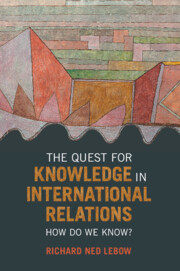Book contents
- The Quest for Knowledge in International Relations
- The Quest for Knowledge in International Relations
- Copyright page
- Dedication
- Contents
- Preface
- 1 Introduction
- Part I What Is Knowledge?
- Part II How Do We Acquire Knowledge?
- Part III How Do We Claim Knowledge?
- Part IV Reason and Cause
- 12 Reason
- 13 Cause
- 14 The Causal Paradox
- 15 Mechanisms
- Part V Conclusions
- Index
14 - The Causal Paradox
from Part IV - Reason and Cause
Published online by Cambridge University Press: 07 April 2022
- The Quest for Knowledge in International Relations
- The Quest for Knowledge in International Relations
- Copyright page
- Dedication
- Contents
- Preface
- 1 Introduction
- Part I What Is Knowledge?
- Part II How Do We Acquire Knowledge?
- Part III How Do We Claim Knowledge?
- Part IV Reason and Cause
- 12 Reason
- 13 Cause
- 14 The Causal Paradox
- 15 Mechanisms
- Part V Conclusions
- Index
Summary
Causal inference accordingly becomes more important in the very conditions that make it more difficult. When people feel less confident about discovering causes, they feel less able to control or manage their environment and correspondingly more at risk. They become insecure and vulnerable, and all the more so to the degree that their livelihood, status, or security depends on causal inference. People have strong instrumental and psychological motives to find ways around this dilemma. I identify and evaluate four generic strategies for coping with the causal dilemma in international relations theories
Keywords
- Type
- Chapter
- Information
- The Quest for Knowledge in International RelationsHow Do We Know?, pp. 189 - 204Publisher: Cambridge University PressPrint publication year: 2022

